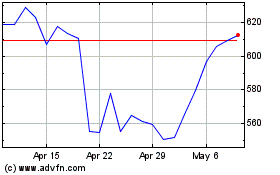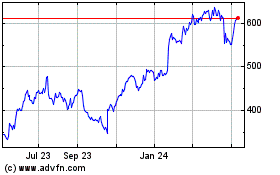By Nicole Nguyen
You've avoided Netflix for years, especially since you're
already paying through the nose for cable. But everybody kept
talking -- and talking and talking -- about "Tiger King." One
night, after crawling into bed, you caved and downloaded the app on
your iPhone.
"Trying to join Netflix? You can't sign up for Netflix in the
app. We know it's a hassle."
You tap the Help button, which yields this unhelpful note: "If
you're not already a Netflix member, please join and come back."
There's no indication where you can start your subscription.
What the Netflix app can't tell you is that the fix is simple:
Go to the web browser on your phone or computer and sign up at
netflix.com.
Netflix isn't the only hugely popular app leaving iPhone users
in the dark about paying for stuff. You can't sign up for a Spotify
account or Amazon Prime membership in their respective mobile apps.
Amazon's Kindle app doesn't let you buy e-books. Same with
Rakuten's Kobo app. Amazon-owned Audible has a complicated credit
system to download audiobooks on iOS.
These apps are broken on purpose, because of Apple's lucrative
App Store rule: Companies are charged 30% of every purchase and
subscription made through iOS apps. (After the subscriber's first
year, the commission is reduced to 15%.) Any developer who wants to
make money on Apple's iPhone and iPad audience must pay a hefty
surcharge for that privilege.
In December 2018, Netflix decided it no longer wanted to give
Apple that cut, so it stopped letting people sign up in the
app.
Blocking subscriptions and payments is just one way developers
push back against the App Store's terms. Here's another: charging
higher rates in iPhone apps. The Tinder app charges $29.99 a month
for a Gold membership (which shows you everyone who's swiped right
on you). Tinder's website charges just $13.49 a month for the same
service.
"Apple is a partner but also a dominant platform whose actions
force the vast majority of consumers to pay more for third-party
apps that Apple arbitrarily defines as 'digital services,' " said a
Tinder spokeswoman. "We're acutely aware of their power over
us."
Google-owned YouTube Music also passes on Apple's 30% fee to
customers. Apple's App Store prohibits mentioning that a lower fee
can be accessed elsewhere, a YouTube spokeswoman said.
Apple's guidelines say developers can't list alternative prices
or discourage purchasing through the App Store in their iOS apps.
An Apple spokeswoman said that developers are free to promote other
pricing outside of the App Store, including on television and
billboards.
The music-streaming app Tidal charges $12.99 a month for its
premium tier on the iPhone but only $9.99 on its website -- and
Android devices.
Google, which operates the Play Store where the majority of
Android apps are downloaded in the U.S., does charge up to 30%
commissions on in-app transactions it handles. But its policies
aren't as ironclad as Apple's. Whereas Apple requires all in-app
purchases to go through the tech giant's own billing software, the
Play Store allows an exception for companies that host digital
content and use their own payment system. As such, Tidal doesn't
have to pay any fees to Google.
On iPhones, the notable exception is Amazon Prime Video. The app
historically circumvented commissions by not offering entertainment
rentals or purchases to iOS users. In April, Amazon began using its
own payment system to fulfill the purchases.
According to Apple, Amazon is in a program for "premium video
providers" permitted to use the payment method tied to customers'
existing video subscriptions. Two European entertainment companies,
Altice One and Canal+, are also in the program. But the move did
seem like a concession aimed at getting Amazon Prime Video -- of
which Amazon reports over 150 million members world-wide -- to
finally work on the Apple TV device.
Google isn't just more relaxed about payment systems. Android
app makers in the Play Store are allowed to tell users to subscribe
elsewhere. And because Android is an open ecosystem, people can
download their apps directly from developers or through other app
stores, and Google doesn't get a cut. (When Epic Games Inc.
launched the popular Fortnite, it bypassed Google's Play Store for
18 months to evade fees.)
So while Android holds most of the global smartphone market
share -- around 85% on Android vs. 14% on iOS -- Apple has borne
the brunt of public and regulatory scrutiny about the App Store's
policies and business model.
"Apple doesn't have a monopoly on smartphones, but it's hard to
say that they don't have a monopoly over iOS users," said David
Barnard, an independent developer who's had three apps in Apple's
App Store over the past 12 years. Besides, Apple is historically
better than Google at monetizing apps. "If you want to exist on
mobile, you have to go through Apple as a gatekeeper."
Apple decides what does and doesn't have to use its billing
system. (Yes to games like Candy Crush Saga; no to services like
Airbnb and Uber.) That leverage is an issue that was recently
brought to the fore when the developers of an email app called Hey
prompted a firestorm in the developer community by saying Apple
enforces its policies unevenly.
Hey, still in beta, is charging $99 a year for access to its
privacy-forward email service. Apple rejected the app on the
grounds that it lacked a sign-up (i.e., pay-up) option. The Apple
spokeswoman said users should be able to download an app and use it
right away. The exemption granted to Netflix, Spotify and others in
the "reader" category did not apply to Hey.
"Apple just doubled down on their rejection of Hey's ability to
provide bug fixes and new features, unless we submit to their
outrageous demand of 15-30% of our revenue," tweeted David
Heinemeier Hansson, chief technology officer of Hey developer
Basecamp.
Apple eventually approved the Hey app -- Hey bent to the App
Store's rules by creating a workaround, in the form of a free trial
account that expires after two weeks.
Apple's power to determine which app makers can and can't
operate a business is now under official regulatory review. Last
week, the European Union launched a probe into whether Apple
violated competition laws following a complaint by Spotify, which
called the App Store's 30% commission a "discriminatory tax" that
gives an unfair advantage to Apple's in-house streaming service
Apple Music.
The Apple spokeswoman said its fees are used to fund the
company's efforts to reduce spam, malware and fraud, as well as its
constant review of apps for privacy, security and content purposes.
She pointed to the free developer tools Apple provides, such as
TestFlight for beta testing, technical support, compilers and
Xcode, the software environment that allows developers to build
their apps.
Mr. Barnard says he has paid $700,000 in fees to Apple over 12
years -- more than his current net worth -- but agreed there's
"unequivocally" a benefit to developing for Apple's App Store: "I
didn't have to manage a web store, downloads, payments, taxes, VAT.
Apple has taken so much complexity out for businesses and
consumers."
What's great about the iPhone is, whatever Apple doesn't build
itself, someone else builds for it. Imagine an iPhone without Uber,
or an iPad without YouTube. But when developers deliberately break
their own apps, Apple should at least let them tell their customers
why.
(Dow Jones & Co., publisher of The Wall Street Journal, has
a commercial agreement to supply news through Apple services.)
Email your app issues to nicole.nguyen@wsj.com. For more WSJ
Technology analysis, reviews, advice and headlines, sign up for our
weekly newsletter.
Write to Nicole Nguyen at nicole.nguyen@wsj.com
(END) Dow Jones Newswires
June 28, 2020 09:14 ET (13:14 GMT)
Copyright (c) 2020 Dow Jones & Company, Inc.
Netflix (NASDAQ:NFLX)
Historical Stock Chart
From Apr 2024 to May 2024

Netflix (NASDAQ:NFLX)
Historical Stock Chart
From May 2023 to May 2024
